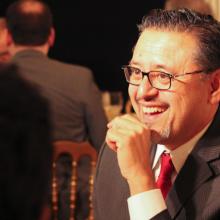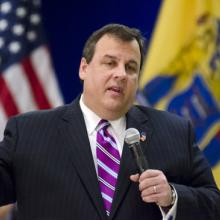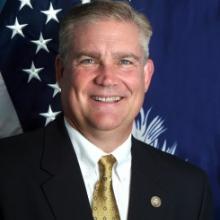Evangelicals

Josh Canfield and Reed Kelly previously competed on the reality TV show “Survivor.” Photo courtesy of Monty Brinton / CBS ©2014 CBS Broadcasting Inc. / RNS
Canfield and Kelly have decided to keep singing each Sunday at Hillsong, despite the restrictions. They recognize that the decision they’ve made is not one that every person in their position should make. But they believe it is the right one for them.
“If every gay person leaves their church because they have been treated poorly, nothing will change,” Canfield said.
“They still want us, and we feel called to stay. And we’re telling all our gay friends at Hillsong to do the same.”
THE KILLING OF 18-year-old Michael Brown in Ferguson, Mo., last year and the events that followed sparked protests by the community in the St. Louis area asserting that black lives matter and ignited a discussion on race relations in the United States.
On the heels of non-indictments in the slaying of Brown and other black men, our nation focused its attention on the drastic inconsistencies inherent in our judicial system. To many observers, black lives had less standing in our nation than white lives.
Rodney King, Trayvon Martin, Mike Brown, Eric Garner, Tamir Rice, Walter Scott, and the churchgoers in Charleston, S.C., are part of a long list of black victims of violence. They are victims of an American narrative that devalues black souls, black lives, black bodies, and black minds. In response to these tragic events, particularly since the non-indictment of the police officers who killed Brown and Garner, many evangelicals have been calling for a biblical practice that is often absent in American Christianity—the call to lament.
On one level I am thrilled that evangelicals are discovering the importance of lament in dealing with racial injustice. However, I am concerned that the way lament is being used by some white evangelicals is a watered-down, weak lament that is no lament at all.
Lament is not simply feeling bad that Brown won’t be able to go to college. Lament is not simply feeling sad that Garner’s kids no longer have a father. Lament is not asserting your right to confront the police because, as a white person, you won’t be treated in the same way that a black protester may be treated. Lament is not the passive acceptance of tragedy. Lament is not weakly assenting to the status quo. Lament is not simply the expression of sorrow in order to assuage feelings of guilt and the burden of responsibility.
Former Arkansas Gov. Mike Huckabee is no stranger to the pulpit — or politics. The former Fox News Channel host announced May 5 his bid for the GOP nomination for the White House. Here are five facts about this Southern Baptist’s perspectives on faith.
Pardon the yawn.
The 1.8 million-member Presbyterian Church (USA) on March 17 voted to officially approve of same-sex marriage, an announcement that shouldn’t surprise anyone who has followed the mainline Protestant denomination’s trajectory. Perhaps a more substantial but less widely reported story was the decision by City Church, San Francisco’s largest evangelical congregation, to affirm LGBT couples.
Evangelicals are among the most stalwart opponents to LGBT marriage, but a number of evangelical congregations have publicly shifted their stance in the last year. Among them are Seattle’s Eastlake Community Church, Nashville’s GracePointe Church, Portland’s Christ Church, and New Heart Community Church in La Mirada, Calif. Other prominent evangelical pastors tell me off the record that they are in the midst of similar conversations.
Churches aren’t the only evangelical factions inching left on matters of sexuality.
Before she and her husband adopted a son and daughter from Ethiopia, popular evangelical blogger Jen Hatmaker said she had a different view about race in America.
“A couple years ago, I would’ve said we’re moving to a post-racial society because I was so under-exposed to people of color and the issues they deal with on a daily basis,” said the white Christian author, whose home renovation to make space for their growing family of seven was recently featured on HGTV.
As evangelicals have turned their attention toward adoption in the past decade, families like the Hatmakers are grappling with race relations in a profoundly personal way, especially as national news spotlights racial tension in New York, Ferguson, Mo., and elsewhere.
And evangelicals aren’t alone: A new Gallup poll found that 13 percent of Americans believe racism is the country’s most important problem, the highest figure since the 1992 verdict in the Rodney King case sparked riots in Los Angeles.
And, as Gallup noted: “After barely registering with Americans as the top problem for two decades, race relations now matches the economy in Americans’ mentions of the country’s top problem, and is just slightly behind government (15 percent).”
While Republican leaders blast President Obama for taking executive action on immigration reform, some prominent evangelical leaders are welcoming the president’s plans to keep about 5 million undocumented immigrants from being deported.
Evangelicals are a key voting bloc for the GOP, but on immigration some are taking a pragmatic step away from the party. They include Hispanic leaders such as the Rev. Samuel Rodriguez who say the time has come to manage what has become a “de facto humanitarian crisis” for millions of immigrants.
“This merciful action takes place because for years our government, under the leadership of both parties, failed miserably as it pertains to immigration,” said Rodriguez, president of the National Hispanic Christian Leadership Conference.
Rodriguez planned to be with Obama on Nov. 21 in Las Vegas, where the President hopes to rally for his new steps.
God bless online media. Almost half of U.S. adults (46 percent) say they saw someone sharing “something about their faith” on the Internet in the last week.
And one in five (20 percent) say they were part of the Internet spiritual action on social networking sites and apps — sharing their beliefs on Facebook, asking for prayer on Twitter, mentioning in a post that they went to church.
“The sheer number of people who have seen faith discussed online is pretty striking,” said Greg Smith, associate director of religion research for Pew Research Center.
Megachurch pastors have mega-followings online. Joel Osteen of Lakewood Church streams his Houston services online. Rick Warren of Saddleback Church has 1.8 million likes on his Facebook page. And Pope Francis has more than 4.6 million English-language followers, chiefly American, for his @Pontifex Twitter feed.
On Nov. 6, Wheaton, “the Harvard of Christian colleges,” is hosting a forum on the death penalty. But it’s not just any forum. It has potential to reshape the way evangelicals in America think about the topic.
In addition to Wheaton’s own ethicist Vincent Bacote and Mercer University scholar David Gushee, the panelists include Kirk Bloodsworth, who spent eight years on death row for a crime he didn’t commit. Also on the panel is Frank Thompson, former superintendent of the Oregon State Penitentiary who witnessed executions. And finally, there is Gabriel Salguero, who heads up the National Latino Evangelical Coalition and is also a member of the National Association of Evangelicals, a Christian powerhouse representing 45,000 congregations from over 40 denominations.
This is big.
I’ll admit, part of me wished this monumental death penalty event was happening at my alma mater, Eastern University. After all, Eastern is well-known for its social justice edge, its progressive faculty — folks like Tony Campolo and Ron Sider. One Eastern alum, death penalty lawyer Bryan Stevenson, was recently called “America’s young Nelson Mandela” by Desmond Tutu and interviewed in Time magazine and The New York Times.
After I pouted a little while, I realized the significance of this forum.
An alliance of evangelical organizations has pledged to dramatically increase the number of church-based legal clinics across the country to assist immigrants with the complicated processes of seeking green cards, visas and family unification.
The Immigration Alliance, a network of 15 evangelical denominations and ministries, on Oct. 21 launched a plan to reduce the gap between the 22 million immigrant noncitizens and the 12,000 private immigration lawyers in the country.
“Churches are a trusted presence in immigrant communities that can — and should — help address this critical shortage of legal services,” said Noel Castellanos, the alliance’s board chair and the CEO of the Christian Community Development Association, in announcing the new venture.
The alliance, which was formed in 2013, estimates that there also are 2,800 nonprofit attorneys and accredited staff in the country. The umbrella network includes the National Association of Evangelicals, the Assemblies of God, the Church of the Nazarene and the National Latino Evangelical Coalition, among others.
New Jersey Gov. Chris Christie and former Florida Gov. Jeb Bush were not invited to a major gathering of social conservatives in Washington last weekend in what was viewed as a serious snub of two men considered prominent Republican presidential contenders for 2016.
“They were not invited this year because they just weren’t on the top of the list in terms of what they are doing right now and whether or not it was relevant to the values voters and who they want to hear from,” said Tony Perkins, head of the Family Research Council and chief organizer of the Values Voter Summit, which opened on Friday and ended Sept. 28.
“They shouldn’t take it the wrong way,” Perkins told David Brody of the Christian Broadcasting Network in an interview taped on Friday.
But in his report, Brody said the two men had been “snubbed” and that’s not good news for any presidential aspirations they may harbor.
The Values Voter Summit is the pre-eminent venue for GOP candidates who hope to showcase their bona fides to the crucial conservative Christian bloc, and Christie and Bush — the elder brother of former President George W. Bush — are seen as Republicans who could appeal to the center of the electorate but who have not won the hearts of social conservatives.
When victims of sexual abuse by Catholic priests first organized into a small band of volunteer activists in the late 1980s, reports of clergy molesting children were still new and relatively few. Most were minimized as anomalies or dismissed altogether — much the way the victims were.
But today, as the Survivors Network of those Abused by Priests, or SNAP, marks its 25th anniversary at a conference in Chicago, its members can take satisfaction in seeing that its claims have been validated, and a few (though hardly all) of its recommendations have been implemented by the church hierarchy.
And instead of facing constant verbal attacks and the occasional angry parishioner spitting on them at a protest, SNAP’s members today are far more likely to receive a handshake and a word of thanks, and maybe even a donation.
SNAP’s advocacy on the Catholic scandal also helped push the reality of sexual abuse into the public consciousness to the point that victims can regularly win in courts and get a hearing in the media, and they are much more likely to come forward to tell their stories, whether they were abused by clergy or by athletic coaches or Boy Scout leaders.
Yet that success is also presenting SNAP with a daunting new challenge as it looks to the future: how to respond to a flood of new inquiries from victims from other faiths and institutions, and how to push for changes beyond the familiar precincts of the Catholic Church.
According to a new survey, white evangelical Christians feel a lot of warmth toward Jews.
As for Jews, they feel colder toward evangelical Christians than they do about any other religious group.
Cue the Taylor Swift ballads: We have here a serious case of unrequited love.
The Republican National Committee on Friday launched its first web-based effort to rally conservative believers behind the party, a sign of how crucial voter turnout will be in this fall’s close-fought midterm elections and an indication that the GOP cannot take its evangelical Christian base for granted.
“This shouldn’t be outreach, this should be who we are — it is who we are,” said Chad Connelly, director of faith engagement for the Republican National Committee and the force behind this new initiative, GOPfaith.com.
Evangelicals, Connelly said, “are our biggest, most reliable voting bloc.”
The problem, however, is that even though evangelicals identify more closely than ever with the GOP, they have not been turning out at the polls in sufficient numbers to carry Republican candidates to victory.
How many voters know that former Florida Gov. Jeb Bush is a Roman Catholic? Or that Texas Sen. Ted Cruz is a Southern Baptist, not a Latino Catholic? Or that Florida Sen. Marco Rubio worships at both a Catholic parish and an evangelical church?
More importantly, does it matter?
Actually, it does in today’s Republican Party, where a number of factors have forged a new religious identity that supersedes familiar old categories.
These prominent Republicans are emblematic of the new religious amalgam that, in many instances, has helped refashion denominational differences that were once almost insurmountable. Look no further than the stunning Virginia primary victory of Dave Brat, a Catholic with degrees from a Reformed Protestant college in Michigan and Princeton Theological Seminary, who took down House Majority Leader Eric Cantor last week.













